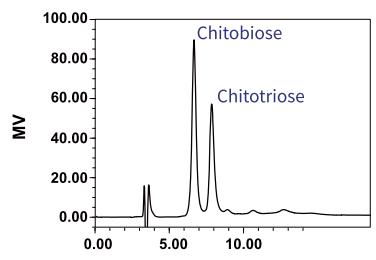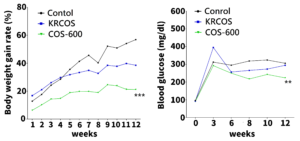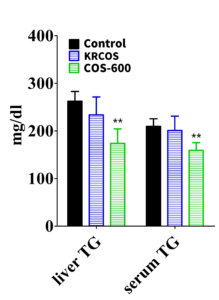: Chitobiose + chitotriose > 90%
High purity COS-600 reduces blood glucose and triacylglycerides more efficiently than other chitooligosaccharide products.

Chitooligosaccharide (COS) is a small molecule hydrolyzed chitosan, whose degree of polymerization (DP) is about 2-10. The most attracted bioactivity of COS is to reduce factors causing metabolic syndrome and other activities include anti-oxidation, anti-inflammatory, and immune regulation (1). A growing amount of reports shows that hyperglycemia and hyperlipidemia induce oxidative stress and chronic inflammation by increased free radicals, and subsequent immune dysfunction (2). In recent years, many companies and institutes in China, Korea and Japan have explored applications of COS to improve hyperglycemia through incorporation into healthy foods.
- Higher absorption efficiency of COS-600
Chitobiose and chitotriose are the only COS that are small enough to be absorbed directly by the gastrointestinal tract and skin; therefore, they can be detected in blood 30 minutes after administration (3). Simpson Biotech produces ultra-low molecular weight COS products, COS-600 Plus and COS-600 Super, which contain over 65% and 95% of chitobiose and chitotriose, respectively, per total product weight.
- COS-600 reduces blood glucose and triglycerides more efficiently than other chitooligosaccharide products
In 2018, the research team from College of Life Science (NTHU) and Laboratory Animal Center (NCTU) compared the effect of oral COS-600 or commercial COS from Korea (KRCOS) on the metabolic regulation by Type-II diabetic mice model. The data validated that COS-600 can down-regulate body weight gain, blood glucose and triglyceride (TG) more effectively than COS product from Korea (KRCOS):
Fig.1 Reduction of body weight by COS-600. Fig. 2 Blood glucose reduction by COS-600.

Fig. 3 TG reduction by COS-600.

In conclusion, COS-600 (chitotriose and chitobiose) reduce body weight gain, blood glucose and triglycerides more efficiently in hyperglycemia mice than normal commodity. COS-600 contains higher chitobiose and chitotriose content designed to increase oral bioavailability. COS-600 improve hyperglycemia symptoms by increasing metabolic rate in animals, thus diminishing the accumulation of carbohydrates and lipids caused by over-eating. Current results indicate that COS-600 is a very safe, promising ingredient for blood sugar control, body weight control, and metabolic syndrome improvement.
- COS-600 improve NAFLD & blood pressure
Oral administration of high purity chitobiose and chitotriose can prevent the non-alcoholic fatty liver disease (NAFLD) by reducing the high-fat diet induced triglycerides and free fatty acid accumulation in liver(6). In addition, chitobiose and chitotriose are the only 2 chitooligosaccharides with angiotensin I converting enzyme inhibition (ACEI) activity. Oral administration of chitotriose reduced the blood pressure in Spontaneously hypertensive rat(7).
Applications: Oral agent for –
- Blood glucose control
- Body weight control
- Metabolic syndrome control
- Liaqat, F. and R. Eltem, Chitooligosaccharides and their biological activities: A comprehensive review. Carbohydr Polym, 2018. 184: p. 243-259.
- Mayne, S.T., M.C. Playdon, and C.L. Rock, Diet, nutrition, and cancer: past, present and future. Nat Rev Clin Oncol, 2016. 13(8): p. 504-15.
- Chen, A.S., et al., Pharmacokinetics of chitobiose and chitotriose administered intravenously or orally to rats. Biol Pharm Bull, 2005. 28(3): p. 545-8.
- Zheng, J., et al., Chitosan oligosaccharides improve the disturbance in glucose metabolism and reverse the dysbiosis of gut microbiota in diabetic mice. Carbohydrate Polymers. 2018. 190: 77–86.
- Chen, A.S., et al., Pharmacokinetics of chitobiose and chitotriose administered intravenously or orally to rats.Biol Pharm Bull, 2005. 28(3): p. 545-8.
- Qian, M., et al. Chitosan oligosaccharide ameliorates nonalcoholic fatty liver disease (NAFLD) in diet-induced obese mice. Mar. Drugs. 2019. 17: 391.
- Hong, S.P., et al., ACE inhibitory and antihypertensive effect of chitosan oligosaccharides in SHR. Korean J. Food Sci. Technol. 1998. 30(6): 1476~1479.
